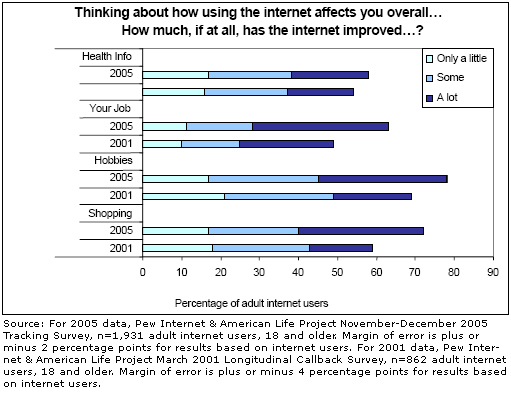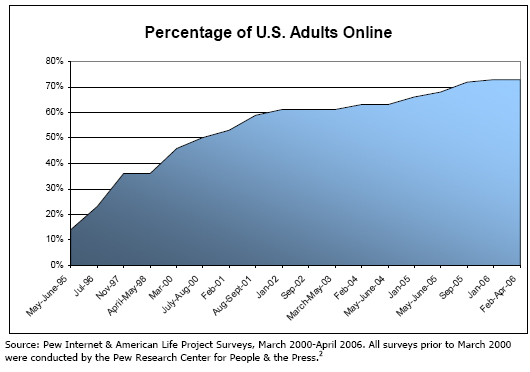Internet penetration has now reached 73% for all American adults. Internet users note big improvements in their ability to shop and the way they pursue hobbies and personal interests online
The importance of the internet in key areas is growing
As one measure of the impact of the internet, we have repeatedly asked online Americans whether or not the internet has improved various aspects of their life. Over time, internet users have become more likely to note big improvements in their ability to shop and the way they pursue their hobbies and interests. A majority of internet users also consistently report that the internet helps them to do their job and improves the way the get information about health care. Some key findings are listed below:
- The share of online Americans who say the internet has greatly improved their ability to shop has doubled—from 16% to 32%—since March 2001.
- The share of online Americans who say the internet has greatly improved the way they pursue hobbies and interests has grown to 33%, up from 20% in March 2001.
- The share of online Americans who say the internet has greatly improved their ability to do their job has grown to 35%, up from 24% in March 2001.
- The share of online Americans who say the internet has greatly improved the way they get information about health care has grown to 20%, up from 17% in March 2001.

Those who use the internet most cite the biggest improvements
In all four categories (health information, job, hobbies and shopping), the internet earns the highest marks among the most frequent users. For instance, daily internet users are twice as likely to report that the internet improves their ability to do their job “a lot” when compared with those who only go online several times a week (45% vs. 17%). Likewise, 39% of daily internet users report that the internet has improved the way they pursue their hobbies and interests “a lot,” while about half as many (21%) users who go online several times per week say this.
Equal shares of men and women note the positive effects of the internet in commerce and the workplace; about a third of both groups say the internet has improved their ability to shop or do their job “a lot.” Improved access to healthcare information is more likely to be noted by women (22% of female users say the internet has improved the way they get health care information “a lot” vs. 17% of male users), while greater numbers of men tout their improved ability to pursue hobbies and interests (38% of male users say the internet has improved the way they pursue their hobbies and interests “a lot” vs. 27% of female users).
For shopping, younger users are more likely to report big improvements overall, but older users report more growth over time. However, with hobbies, users under the age of 50 report both the most positive effects and the biggest increases since 2001. Those who note the way the internet helps them to do their job report relatively little variation according to age. Only those who are age 65 and older (and likely to be retired) are dramatically less likely to praise the internet’s role in their job. Health care also generally yields comparable positive marks across the generations, with the most change since 2001 registering among the youngest (18-29) and oldest (65+) users.
Internet penetration reaches a new high-water mark
While the share of internet users who report positive impacts has grown, the sheer size of the internet population also continues to increase. Surveys fielded in 2006 show that internet penetration among adults in the U.S. has hit an all-time high.1 While the percentage of Americans who say they use the internet has continued to fluctuate slightly, our latest survey, fielded February 15 – April 6, 2006 shows that fully 73% of respondents (about 147 million adults) are internet users, up from 66% (about 133 million adults) in our January 2005 survey. And the share of Americans who have broadband connections at home has now reached 42% (about 84 million), up from 29% (about 59 million) in January 2005.

As noted recently in our Generations Online report, internet use still varies significantly across age groups. While 88% of 18-29 year-olds now go online, 84% of 30-49 year-olds, 71% of 50-64 year-olds, and 32% of those age 65 and older say they use the internet. In a separate survey conducted in Oct-Nov 2004, we found that 87% of 12-17 year-olds use the internet.
Those in the lowest-income households are considerably less likely to be online. Just 53% of adults living in households with less than $30,000 in annual income go online, versus 80% of those whose income is between $30,000-50,000. Adults who live in households earning $50,000 or more exceed the national average for internet penetration; 86% of adults living in households with annual income between $50,000 and $75,000 use the internet, compared with 91% of adults living in households earning more than $75,000.
Education also remains an important indicator for internet use. While 40% of adults who have less than a high school education use the internet, 64% of adults with a high school degree go online. Among those who have some college education, 84% use the internet, and 91% of adults with at least a college degree go online.


